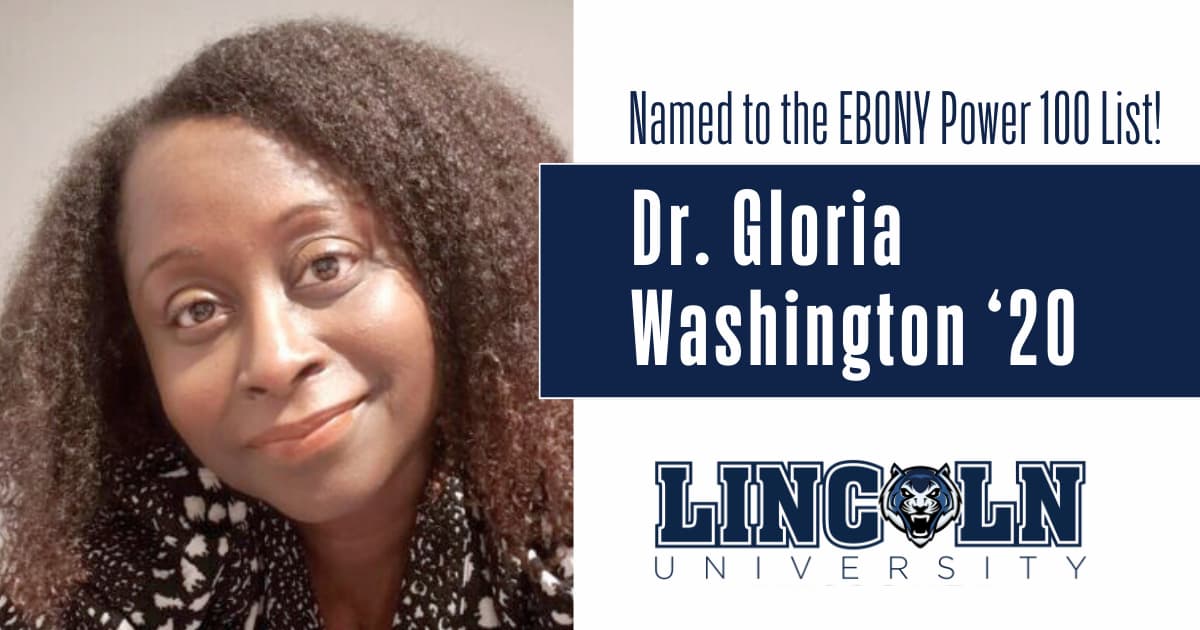From Lincoln to National Recognition: Dr. Gloria Washington's Journey from Lincoln to the EBONY Power 100
Office of Communications and Marketing
Young Hall
820 Chestnut Street
Jefferson City, MO 65101
 Lincoln University alumna Dr. Gloria Washington ’00 has been named to the EBONY Power 100 STEM Trailblazers list.
Lincoln University alumna Dr. Gloria Washington ’00 has been named to the EBONY Power 100 STEM Trailblazers list.
Lincoln University alumna Dr. Gloria Washington, Class of 2000, has been named to the prestigious EBONY Power 100 STEM Trailblazers list, bringing national recognition to her groundbreaking work in affective computing and human-centered design.
When Dr. Gloria Washington chose Lincoln University of Missouri over two decades ago, the decision was primarily financial. The Kansas City native says she initially saw in Lincoln a small HBCU that really fit her financial needs.
What she ultimately discovered, however, was far more valuable than affordable tuition. Her Lincoln education brought community, mentorship and opportunities that would shape her entire trajectory in STEM.
"I got a scholarship, and then I was mentored throughout the whole four years," Washington recalls of her time at Lincoln. "It really was a good decision when looking back at it."
That mentorship proved transformative. During her four years at Lincoln, Washington secured an internship with the Environmental Protection Agency in Kansas City that would last nearly her entire undergraduate career. Working on projects analyzing the chemistry makeup of water bodies around the Kansas City area, she developed groundbreaking software that was "the first of its kind to enter information related with the chemistry of the water" and could determine soluble chemical levels. Her work earned her a bronze award from the EPA — recognition from the entire agency for her innovative contribution.
"Looking back at that time, I wasn't as appreciative as now," Washington admits. "But I got recognition from the whole of EPA. It's like a bronze medal."
The Power of Mentorship
The impact of Lincoln's close-knit community became particularly evident through faculty mentor Linda Thompson, who recognized Washington's potential even when she couldn't see it herself. During her junior year, when scholarship opportunities for PhD programs in computer science arose, Washington was paralyzed by imposter syndrome.
"I was like, 'No, I can't even fathom a Ph.D. in computer science,'" Washington remembers. "And she said, 'You really should apply because you have the grades, you have the knowledge.' She really encouraged me. If I had just sat in my imposter syndrome, I would have never even thought about it."
That encouragement changed everything. Washington not only applied but was accepted, leading her to Washington, D.C., where she earned her M.S. and Ph.D. from The George Washington University. Today, she serves as an associate professor of computer science at Howard University, where she founded the Affective Biometrics Lab.
Pioneering Technology for Social Good
Dr. Washington's current research focuses on affective computing, biometrics, and human-centered design — work that explores how technology can better recognize identity, emotion, and cultural nuance. Her projects range from analyzing how voice-enabled systems interpret Black slang to developing immersive tools that reduce bias among psychiatric professionals. Her research, supported by the Office of Naval Research, the National Science Foundation, and major tech companies, bridges innovation and equity to create more inclusive digital experiences.
Being named to the EBONY Power 100 STEM Trailblazers list represents a full-circle moment for Washington, who still battles imposter syndrome even at the height of her success.
"A lot of people don't know that Lincoln University in Missouri is in Missouri. They say, 'Oh no, the one in Pennsylvania.' I'm like, 'No, it's the one in Missouri,'" she laughs. "We're a small HBCU and we're proud of it. To represent on this main stage... I didn't think anybody would get this type of award from Ebony Power 100. It is a dream for me for even people knowing my name and recognizing my work."
The Lincoln Advantage
Washington's success story highlights what she sees as Lincoln University's unique strengths in STEM education. The small class sizes allowed her to develop close relationships with professors and access numerous research opportunities throughout her undergraduate years.
"I had a whole bunch of within-the-semester research opportunities that contributed to helping me pay for my living," she explains. "I never struggled because everybody needed a research assistant to work on computer-related stuff. It was instrumental to both my coursework and to my trajectory."
This hands-on experience, combined with faculty who genuinely cared about students' futures, created an environment where Washington could thrive. "My professors actually cared about where I was going," she reflects. "I think that says a lot for a university, especially in this day and age, because you really need that to be successful."
A Message for Future Blue Tigers
As someone who has achieved national recognition in her field, Washington has a clear message for students considering Lincoln University: "I think people sleep on Lincoln education and they need to rethink that. It's cost-effective, it's small, the class sizes can really benefit you. You're not lost. You can actually know your professors."
Her advice comes from experience. Washington's journey from a financially motivated college choice to the EBONY Power 100 demonstrates the transformative power of an HBCU education that combines academic rigor with personal investment in student success.
"If people don't know who you are and aren't helping you get to where you want to go, it's not going to be an easy road," she emphasizes. "Hopefully Lincoln gets a little bit more shine related to people going there."
The EBONY Power 100 STEM Trailblazers list celebrates scientists and innovators whose groundbreaking work in technology and research demonstrates how science can inspire, transform and elevate humanity.
